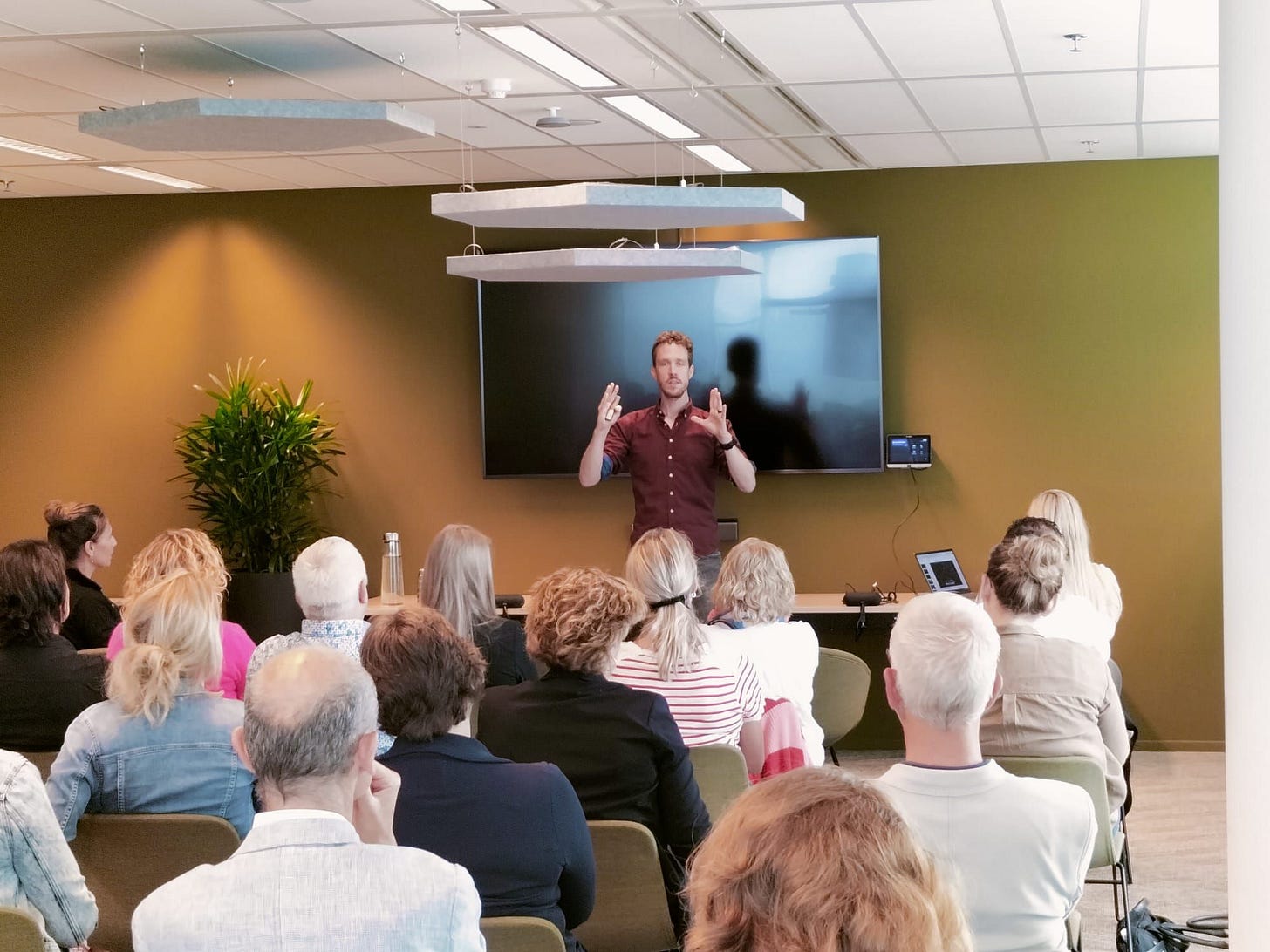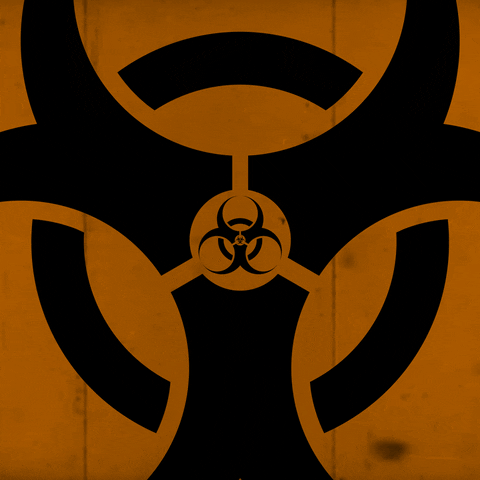Hey there,
Suppose we solve humanity's biggest problems with biotechnology. Such as the climate crisis and social inequality. But then? Can malicious terrorists and criminals use these technological possibilities just as well? And how can the police defend themselves against this?
Every month I write a future scenario to amaze, inspire, frighten and above all make you think about the increasing role of technology in our lives.
In this month's scenario, I explore the future of police work and synthetic biology.
Enjoy reading!
Peter
Scenario: Police work after the Biotech Revolution
Six drones nervously fly up ten feet above the street. They maneuver smoothly around a group of pigeons and fly back into formation within a second.
At the European headquarters in Brussels, Jennifer glances at the drone images on the screens on the wall. She reads the new Interpol briefing on her tablet and taps through the file with the index finger of her left hand. Looking for the SB updates.
The ear of a half-full cup of cold tea with mint leaves hangs from the index finger of her right hand. The smell and taste of mint gives her the feeling of relaxation and alertness.
She relies on the drones, but even more on COP: the Continuous Operational Policing system. An artificially intelligent assistant that picks up the data from the cameras, microphones and biosensors, and analyzes them at lightning speed. The COP alerts her if something is wrong.
Jennifer and her colleagues are responsible for fine tuning and updating the algorithms that collect the data from the biosensors. The biosensors are everywhere: on patrol drones, police cars, lampposts, public buildings and in sewers.
Advances in synthetic biology have brought unexpectedly much to the world. From meat from bioreactors and degradable tailor-made clothing, to oil made from algae, biological batteries and fungi that eat harmful chemicals.
But technological innovation is not immune to criminals and terrorists.
That's what Jennifer is looking for in the briefing. The SB updates. SB stands for synthetic biology. The list seems to get longer every month: DNA-personalized viruses targeting world leaders, threats of biological SPAM to manipulate stock prices, a DOS attack with pathogens on the staff of the country's main cybersecurity company, and yet another artificially manufactured pandemic.
Jennifer puffs her cheeks with air, purses her lips and exhales slowly. Time to check whether Interpol has already put the corresponding DNA, mRNA and protein codes in COP. She starts the tests in the simulation environment.
'Message 74' appears on the screen. She holds the cup of cold mint tea tightly in her hand. She stares for a moment at the dried leaves at the bottom of the cup.
“Okay, here we go.”
Background of the scenario
I wrote this short story based on an assignment I recently did for the Dutch Police. Last month I gave a lecture and workshop on scenario planning for the members of the Next Generation project about police work in the future.
The security domain is not an unfamiliar topic to me. For example, in April I gave a lecture to students of the Police Academy and at the end of last year to employees of a penitentiary in the Netherlands.
The participants worked in groups to think about a day in the life of a police officer in 2040. The groups came up with creative finds: being in several places at once with a hologram, the influence of China, extreme life extension, and cooperating with drones.
On the way home, I thought about how I would work out the assignment. This put me on the trail of synthetic biology, precisely because I am preparing a lecture about it for TBX 2022 on that subject.
In the story above, I have combined both elements. What is the threat of synthetic biology in the future, and how can the police arm themselves against it? I also thought it would be fun to incorporate that into a police officer's workday in the future. In Jennifer's case: to what extent does that change the nature of police work and, with it the necessary skills and capabilities?

Deep Dive
Articles, books, podcasts, videos, documentaries and more on this theme.
1. FURTHER READING / Marian Elgabry obtained her PhD from University College in London with her research into the future of crime with biotechnology.
Marc Goodman wrote this article about biotechnological applications of contemporary computer crime. Although this piece is from 2013, it is still relevant and still captures my imagination.
The combination of biotechnology with artificial intelligence offers new opportunities and threats. Like this piece about a study in which an algorithm designs about 40,000 hypothetical bioweapons.
2. BOOK / Paul Le Roux is kind of a villain from a recent James Bond movie: he buys drugs in North Korea, with his technical knowledge he builds an online empire to sell those drugs, he sells weapons to Iran, and has a mercenary army in Somalia. With amazement and horror, I witnessed the hunt for Le Roux in Evan Ratliff's book The Mastermind. Also great as an audiobook.
3. WATCH / In the series Brooklyn 99 (Netflix) you follow a police team in New York City. Susan and I like to watch an episode before going to bed. Why? The episodes are 20 minutes each, the humor is quite clever, and the characters have a nice mutual dynamic. Detective Jake Peralta (played by comedian Andy Sandberg) is the main character, but we especially like Commander Raymond Holt (Andre Braugher).
Lectures & webinars 🎤
I give lectures (online and offline) about human augmentation, trends and scenario planning. These are upcoming events where I will give a talk or webinar, in Dutch or English. Great to see you there!
Lecture Actuary Day - October 6, 2022
Lecture Imagine Film Festival - October 29, 2022
Webinar The Devine Complex (UK), November 1, 2022 (English)
Lecture Universiteit Gent (BE) - November 14, 2022
Lecture Jeroen Bosch Hospital - November 18, 2022
Lecture Topsprekers Zorgonderwijsvernieuwers - November 25, 2022
Lecture Talententuin Achterhoek Werkt - November 25, 2022
Workshop Topsport Community - November 28, 2022
Lecture PSV - December 1, 2022 ⚽️
Workshop Hogeschool van Amsterdam, December 7, 2022
Lecture Unica Hengelo in 2022 (date tbd)
Lecture EDSN in 2022 (date tbd)
Keynote UPPS TU Delft - April, 2023 (English)
Lecture Royal Airforce - May, 2023 ✈️

Thank you for reading 🙏
This newsletter is free, but not cheap to make.
You can help me in a number of ways: forward it to someone who likes it, subscribe to my YouTube-channel, hire me to speak, or for a webinar 😘

